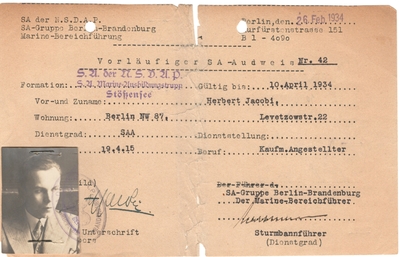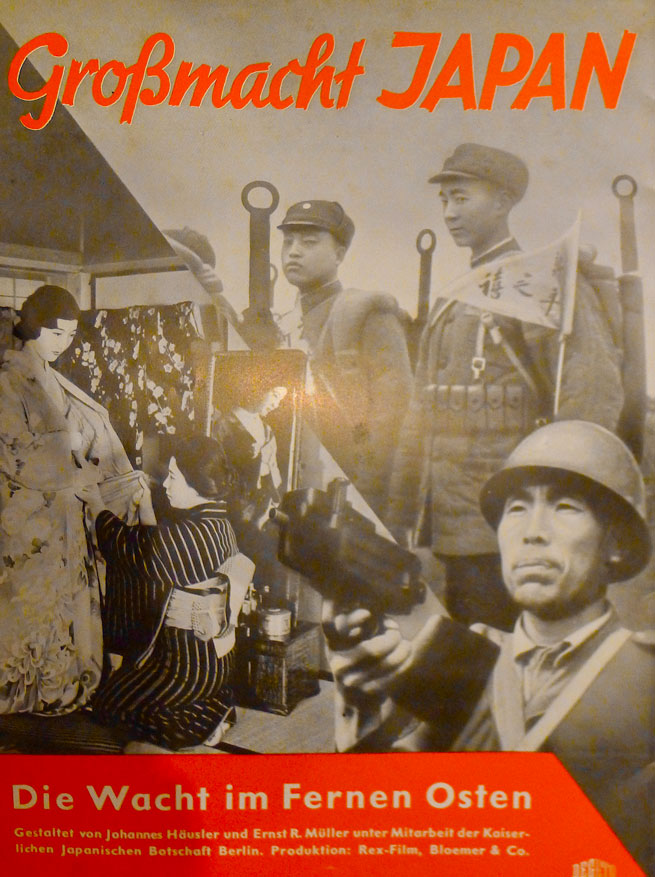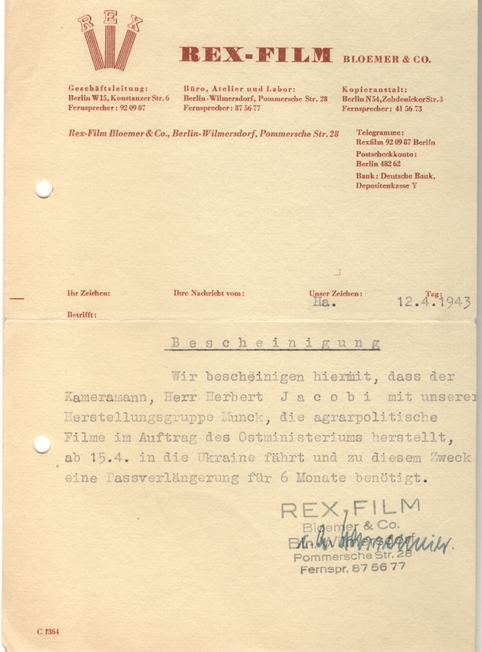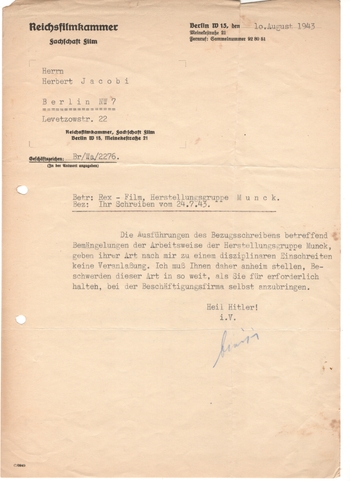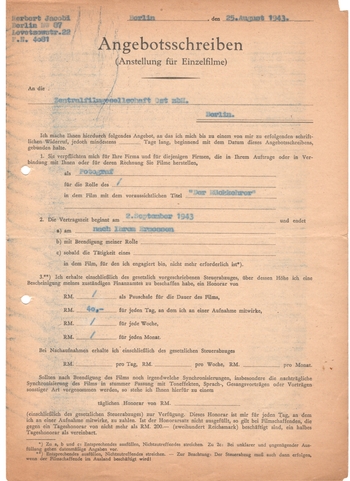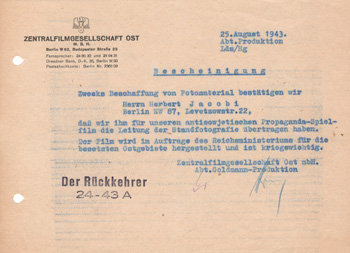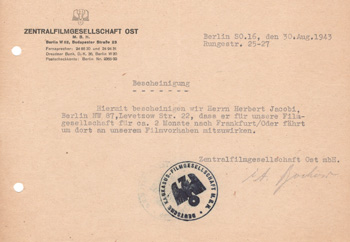- Home
- POSTER GALLERY
- ❗️BOOK & POSTER STORE❗️
- About the Posters
- The William Gillespie Collection
- Our Publishing House
- ❗️GFDN interviews author and collector William Gillespie ❗️
- Our most expensive & inexpensive finds!
- ❗️***NEW!*** Poster of the Month ❗️
- ❗️NEW ❗️Film Posters – Demands on an important means of film advertising. ❗️
- In our Book + Zeitschrift Library
- ❗️ ***NEW!*** Hitler Youth Quex – A Guide for the English–speaking Reader ***NEW!*** ❗️
- ❗️***NEW!*** Table of Contents of our new HJ QUEX book❗️
- ❗️Hitler Youth Quex Guide - early praise! ❗️
- Recent loans from the Collection
- Farewell Horst Claus. (1940–2024)
- "Der Deutsche Film" Zeitschrift
- ❗️ ***NEW!***German "Tendency" Films (Tendenzfilme) in the Third Reich ❗️
- KARL RITTER
- Karl Ritter original film posers in this Collection
- "Besatzung Dora" ( † 1943)
- "The Making of The Crew of the Dora"
- Karl Ritter at the 1938 Reichsfilmkammer Congress
- INDEX -"Karl Ritter" book, 2nd edition
- Karl Ritter's Legion Condor (1939, unfinished)
- Excerpt from our "Dora" book
- ∆∆∆∆∆ High praise for our DORA book! ∆∆∆∆∆
- TABLE OF CONTENTS – "Legion Condor"
- § § § § § Early Praise for our LEGION CONDOR book! § § § § §
- ❗️"Das Leben geht weiter" and Karl Ritter ❗️
- Zarah Leander Europe–wide !
- Japan Military Film and Karl Ritter
- Karl Ritter after 1945
- 1935 Film Congress
- Poster Exhibition in Berlin, March 1939
- Potsdam poster exhibition 12 April–25 August 2019
- Leni Riefenstahl's two "Olympia" Films (1938)
- "Ohm Krüger" (1941)
- Emil Jannings
- "Blutendes Deutschland" (1933)
- Hannes Stelzer ( † 1944)
- Klaus Detlef Sierck ( † 1944)
- Film stills
- Reich Film Censorship Offices
- ❗️Dateline: Ufa - April 11, 1945 ❗️
- ❗️***NEW!***The Fate of the German Film Industry in May 1945 ❗️
- Film censorship cards
- Film Archives
- Cinema advertising
- School filmstrips
- ❗️UPDATED❗️ Z F O / Ostland Film G-m-b-H
- Z F O / Herbert Jacobi estate
- ZFO / Ostland Film newspaper articles
- ❗️***NEW!*** Roter Nebel / Red Fog / Red Mist (1942/1943, ZFO) ❗️
- ZFO - Der Rückkehrer - The Returnee (1943/1944)
- The D F G production company
- D I F U
- ❗️ ***NEW!*** "Carl Peters" – Special Collection. ❗️
- "Alcazar" (1940, Genina)
- "Der 5. Juni" (1943, banned)
- ❗️ ***NEW!*** Herbert Selpin and his "Titanic" (1943) ❗️
- ❗️ ***NEW!*** Ein Robinson (1940, Fanck) ❗️
- "Fronttheater" (1942)
- Veit Harlan's Jud Süß and Fritz Hippler's Der Ewige Jude
- Harlan "Jud Süß" trial 1949
- Werner Krauss & JUD SÜß
- Anti-Semitic Film Posters in the Collection
- "Heimkehr" (1941)
- "Hitlerjunge Quex" (1933)
- ❗️***NEW!*** Hitlerjunge Quex in 111 Greater Berlin Cinemas ❗️
- Jürgen Ohlsen
- "S.A.Mann Brand" (1933)
- "In der roten Hölle" (Edgar Neville, 1939)
- "Helden in Spanien" (1938)
- The Spanish Civil War in Film
- Andrews Engelmann (1901 – 1992)
- Deutsche Wochenschau
- Uƒa Feldpost
- Uƒa Kulturfilm – Informationen
- " Die Tochter des Samurai" (1937, Fanck)
- Ufa 25th Anniversary
- Invitations to world premieres
- ❗️***NEW!*** Continental Films, Paris 1940–1944 ❗️
- Film Censorship in Occupied Paris 1942
- "Der Sieg des Glaubens" (1933)
- Wilhelm Althaus Estate
- Weimar Germany posters
- Ufa and the Ordensburgen
- The Gaufilmstelle in our Collection
- "Zwei Welten" (1940)
- "Capriccio" (1938) –Karl Ritter film album
- Unrealised NS Propaganda Films 1934–1945
- German Film Directors accused of "war crimes"
- Australian––themed NS feature films
- "Der Störenfried" / "The Troublemaker"
- What was new in 2014?
- What was new in 2015?
- What was new in 2016?
- What was new in 2017?
- What was new in 2018?
- What was new in 2019?
- What was new in 2020?
- What was new in 2021?
- What was new in 2022?
- What was new in 2023 ?
- What's new in 2024?
- ❗️***NEW!*** Hitler assassination attempt in Karl Ritter film cut❗️
- BESATZUNG DORA private photos
- Just discovered 1942 article on BESATZUNG DORA
- The Karl Ritter Tetralogy
- Google Analytics 2023
- Our first–ever acquisition!
- ❤️"Some of our favourite things....!"❤️
- ERRATUM for our " Hitler Youth Quex Guide"
- Trending
- Vale †
- Our Wants List / 2024 / Wunschliste
- Pop Quiz
- Unsere KARL RITTER Bücher in Deutschland liefbar!
- WHERE to buy our books right now?
- ✉️Contact
 “History is not about the facts. It is about the context and who is telling the story.” —Prof. Milton Fine.
“History is not about the facts. It is about the context and who is telling the story.” —Prof. Milton Fine.
"Who controls the past controls the future: who controls the present controls the past." –– George Orwell in his novel "1984."
"Whoever doubts the exclusive guilt of Germany for the Second World War destroys the foundation of post–war politics." –– Prof. Theodor Eschenberg, Rector, the University of Tübingen.
"If we have our own why in life, we shall get along with almost any how." – Friedrich Nietzsche
POSTER GALLERY --view
over 500 German film
original posters between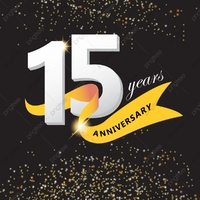
1927–1954 from
Germany and from
many Axis and Neutral countries
across Europe!
Note! Posters in the Poster Gallery are PERMANENT
acquisitions which are NOT FOR SALE!! ONLY the
posters listed in our POSTER STORE are for sale.
(They have a price and order button to use.)
Z F O /Herbert Jacobi Estate documents
In February 2020 we won at auction in Berlin a bundle of documents of a war photographer and motion picture stills cameraman, Herbert Jacobi.
On this page, in conjunction with our other menu page on the ZFO (Central Film Society East), we present here rare original documents particular to Nazi propaganda filmmaking produced and distributed in the Ukraine between 1941 and 1944.
A ZFO cameraman in the Ukraine 1943 –
Herbert Jacobi, Standfotograf

From the estate documents we won at auction in Berlin, we found twenty–six ZFO and Rex–Film letters and memorandum and receipts written to Herbert Jacobi, as well as his reply to some of the letters, all dated between 26 March 1943 and 28 October 1944. We also have two rare original contracts from the ZFO and Rex–Film respectively, hiring Jacobi for two propaganda short films during this period.
For ZFO, Jacobi was the Film Stills photographer for the anti–Soviet film Der Rückkehrer/The Returnee, 'a feature film that was to show the cooperation of the local population with the German occupation authorities -- full of praise for the collaborators.' [citation: B.Drewniak, Der Deutsche film 1938–1945 - Ein Gesamtüberblick, S. 356, Droste Verlag.] For Rex–Film, commissioned by The Ministry for the Occupied Eastern Territories (Alfred Rosenberg's Amt) and contracted through ZFO, he worked on the "agrarian–political" film Die Neue Agrar–Ordnung/The New Agrarian Order. This short film (ca. 400 meters/15 min.) was about the abolishment of the hated Soviet farm collectivisation and restoration of farmland to the peasants.
From the many non–film documents and two ID cards also found in the Jacobi estate, we can re–construct a short biographical sketch of this young man and also provide some insight into the difficult filming conditions the ZFO had to contend with in the USSR during the late war years.
Herbert Jacobi – a short biographical sketch
The documents tell his story:
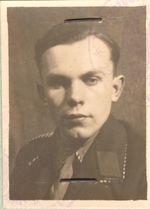 On 27 December 1933 he was requested to send in to the SA-Marine a short summary of his life, his previous political affiliations, as well as 2 pass photos.
On 27 December 1933 he was requested to send in to the SA-Marine a short summary of his life, his previous political affiliations, as well as 2 pass photos.
From his application (Fragebogen) at age eighteen to the Sturmabteilung–Marine (the naval contingent of the Nazi Party's SA) he stated that he was born on 19 April 1915 in Berlin. His parents were of the Protestant faith. His father was a locksmith and a carpenter, his mother a housewife. He was single, had no children, never married. [He later married, as per other documents]. At age 14 he had gone to Volkschule. He was currently a 'salesman’s representative.'
He was a good swimmer, good at water sports, a rower. He had been a member of the Berlin Rowing Club for four years, and in the past year had rowed a total of 1800 kilometers. He was very keen on seamanship and to join the SA–Marine. He did join the SA–Marine. His membership ID we show here:
Subsequently, he was informed on 10 April 1934 that he was to report on 10 November 1934 for "voluntary service" in the Reich Labor Front (RAD) at Berlin–Templehof. (The Nazis began a major renovation in the mid-1930s to make it the world's then largest airport.)
He was working for a Berlin–Wilmersdorf publisher, V. Engel Verlag, to which the SA–Marine requested on 28 May 1934 to please release him for the day to participate in the upcoming Skagerrak Gedächtnis Feier commemoration, to be attended by President von Hindenburg and the Reich Chancellor.
After entering the service of the RAD in November 1934, just eleven days later he was issued a doctor's certificate which stated "After the medical examination by a doctor, entry into the RAD is not possible." But the RAD was quite obviously not prepared to release him so easily.
In a letter to his SA–Marine unit at Berlin Stößensee, penned on 20 May 1935, he reported that he had been working over the previous two months as a press and advertising photographer, and that it was impossible for him to attend functions of the SA–Marine, even on weekends. He asked to be released from duty and hoped that if his employment changed that he would be allowed to re-enlist.
On 19 June 1935 he reported for military conscription registration, and was deferred for a year. He was deferred again in 1936.
On 11 October 1936 he was found to be "untauglich" (unfit) for duty in the RAD and dismissed. Two months later, on 9 December, he complained to the RAD HQ that he was unable to find work again because potential employers feared that he would be re-called to RAD service in 1937. If they could not confirm that his medical condition was on–going, he would have to rely on welfare.
A week later he wrote the RAD again, explaining that he had suffered from age 10 with chronic insomnia and nervousness, which was diagnosed as bronchial Asthma.
On 22 January 1937 to the RAD he reported that he had found no work since his return home from RAD service in October 1936. In March 1937 he sent another letter stating again that he was still unemployable.
His military service had been repeatedly deferred but on 8 September 1941, he wrote to his Wehrbezirk–Kommando (Abt.II-C, Berlin) to remind them that after being dismissed from the RAD on health grounds, due to chronic bronchial Asthma, he had been summoned for duty on 28 June 1937 and again on 15 June 1940 but had been deferred. "To try to become healthy and able to serve, many treatments were undertaken - such as injections in the University Clinic in Budapest. I request that frequent trips -- 5 or 6 -- to Budapest be allowed."
There is a gap in documentation between this letter and the next one dated 22 March 1943. He applied on this date to Rex–Film, Berlin, hoping to find work. He explained that he had worked as a photographer, mostly free–lancing, as an advertising cameraman, but had also worked for Scherl–Bilderdienst. (The Nazi Party's photographic and press archive). Thereafter, he worked as an Assistant Cameraman at the Ufa–Werbefilm (Ufa's commercial advertising film department) and at Prisma–Film Berlin, also an advertising film production house. He concluded the letter by stating that samples of his work and credentials were readily available.
[NOTE: Rex–Film Bloemer & Co. in Berlin–Wilnersdorf was a documentary and short film production company which had been established in 1938. It had already produced some films on military and propaganda themes, such as Großmacht Japan (Great Power Japan) as shown in this advertisement. The Rex–Film Bloemer & Co. is credited on the bottom line.
The director of Großmacht Japan, incidentally, was none other than Johannes Häußler, who directed the 1933/34 film Blutendes Deutschland, and Deutsches Land in Afrika. ]
This is when Jacobi's work for the ZFO and Rex–Film commenced. Just three weeks later he was issued a contract from Rex–Film to be the Film Stills Photographer for the anti–Soviet agrarian film Die Neue Agrar–Ordnung /The New Agrarian Order, commissioned by Alfred Rosenberg's Ministry of the Occupied Eastern Territories. He was to be paid RM 650, - for 3 months' work and any necessary train tickets.
Die Neue Agrar–Ordnung /The New Agrarian Orderfilm was produced, and the 35mm print running 476 meters (17 minutes) is in the Filmarchiv of the Bundesarchiv in Berlin–Lichterfeld. On August 21, 2021 a public screening of this short film and other ZFO films was scheduled for the Zeughauskino in Berlin, and this is an English translation of the descripiton of the film from that source:
The agricultural regulations enacted by the German occupying power decreed the reprivatisation of the former Soviet kolkhozes and urged the peasants to work privately from now on. The film Die neue Agrarordnung advertises the advantages of the new regulation.
For the ZFO, his contract was dated four months later, on 25 August 1943, to work in the same capacity on the anti–Soviet film Der Rückkehrer/The Returnee, at the wage of RM 40, - per day.
Work in Ukraine in 1943 on the two "anti–Bolshevik" films.
Die Neue Agrar–Ordnung /The New Agrarian Order
ABOVE. Rex–Film's statement that Jacobi was engaged to work on the "agrarian-political film'" commissioned by the Ministry for the Occupied Eastern Territories.
Jacobi was sent by Rex–Film to the Ukraine with five other men to produce the Die Neue Agrar–Ordnung. One of the men was the Production Leader named Ernst Munck. This entailed three month–long travels through the Ukraine, with two men travelling by train from Berlin and three driving an automobile with a trailer and all the motion picture equipment. They then rendez–voused in Ukraine and commenced their 3-month sojourn in the car and trailer as a team of five.
Ernst Munck had been an Assistant to the Director on two German feature films in 1935 and 1936. He had also appeared in one of them as an unnamed actor in a very small role. Thereafter, until the end of the Third Reich, he directed six film shorts for Rex–Film/ZFO.
Filming in the primitive Soviet Union during WWII was very difficult at best. One need only read of the innumerable setbacks, bad weather, logistical problems, and Partisan activity during the month that Karl Ritter with his team of 42 men filmed major scenes of his Luftwaffe film Besatzung Dora/The Crew of the Dora in October 1942, to appreciate the many challenges.
In correspondence with the Reichsfilmkammer dated 24 July 1943, reflecting on their three–month long film work in the Ukraine (15.4.–15.7.1943), Jacobi complained that he and his film team of three others, on their drive towards the Ukraine through the Generalgouvernement, and thereafter, were subjected to unacceptable, unprofessional and "uncomradely" behaviour from the Production Leader of the film, Ernst Munck.
Jacobi wrote that Munck, despite being reminded in Berlin, had failed to bring along a Production Manager, so that the team was left to improvise for the problems with the vehicle, accommodation, meals, petrol supplies, etc. Jacobi suggested that Munck, despite having previously led an Army Film team on the Eastern Front, must have known the conditions there, but failed to prepare the expedition to the Ukraine properly. Their vehicle had not been run for three years and was in poor condition, the trailer had no spare tires, jacks or other tools, had no shock–absorbers, and had no dust–proof closure. Consequently, it was unfit for the poor Soviet road conditions, there were numerous flat tyres and breakdowns throughout the trip. Despite placing the Arriflex-Camera inside the automobile, it as well as the other equipment therefore was damaged over the rough terrain –even their suitcases were damaged. Munch has not prepared a travel plan for the trip, and the entire venture was a shambles. For example, they found that only one film script had been packed of a dozen scripts meant to have been brought along, and that they were obliged to write a script on the spot, even though none of them were experts on agriculture, etc. Munck demanded that they film in both poor lighting and poor scenic conditions. "Mr. Munck behaved towards us very un-comradely and ruthlessly. It [the filming] was often senselessly rushed in such a way that we sometimes worked 13–14 hours under very difficult climatic conditions." Despite their protests, Munck had them film in both poor lighting and poor scenic conditions.
Munck had arguments with the members of the team almost every day, refused to allow them to go find food whilst at the same time had his own supply, bummed cigarettes off everyone constantly, and they were witnesses to civilians who engaged with Munck on the trip reacting to his unfriendliness on a regular basis.
"Mr. Munck also pretended to present the filmmakers as 'the biggest racketeers' and 'crooks' in occasional meetings with gentlemen of the German civil administration, although he did not neglect to state that he was a Captain and not a film titular. Mr. Munck behaved in his surely offensive manner (not only towards us) in such a way that numerous special leaders, war administrators and other employees found reasons to make very unpleasant statements."
The two full–page letter ends with the statement that they were happy that the trip had come to an end, and that under no circumstances would they agree to ever work with Munck again.
On 10 August 1943, the RFK Fachschaft Film replied to Jacobi thusly:
"In my opinion, the explanations in the reference letter regarding complaints about the working methods of the Munck Production Group do not give rise to any disciplinary intervention. I must therefore leave it up to you to bring complaints of this kind to the employment company itself, to the extent that it is necessary."
A slightly different version of the letter (with more details about filming conditions and Munck's unprofessional demands, etc.) had in fact been sent directly to Rex–Film by Jacobi on the same day. This letter we do have, but there is no copy of the reply from Rex–Film to Jacobi in our estate documents.
Der Rückkehrer/The Returnee
Amongst the forty–five ZFO propaganda films produced, or partially completed, or planned but never realised before German troops retreated from the East, only two titles were actually of feature–length. The first one was the 1942/43 propaganda documentary film Deutschland. The second title in the ZFO documents which we have name Der Rückkehrer as the 'anti-Soviet propaganda feature film' (the word Spielfilm is used) in all the correspondence mentioning the film title or project. As at December 1944, its production deadline having been missed by three months; it remained an orphan without the soundtrack, music or final cinema release print ever having been completed.
The film was in fact only one of a handful of ZFO films which was not a documentary film. The others were only film shorts with Baltic actors. Film historian Ralf Forster's seminal Chapter 24 in Cinema & the Swastika (2nd edition, Palgrave, ©2011) does not mention the film; but in a ZFO–Filmographie in his Chapter ‘Deutsche Filmpropaganda im “Ostraum” – Die Zentral – Filmgesellschaft Ost (ZFO) 1941-1945,' S.46–64; Träume in Trümmern, CineGraph, 2009 München lists it is a "Spielfilm," or feature-film. There are few production details given, other than it was a Goldmann Produktion for ZFO:

We have unearthed in our newspaper archive a film newspaper article dating from 1 February 1944 which has heretofore never been cited by any scholar, which provides the cast of actors and production and technical crew who worked on Der Rückkehrer. It is from an issue of the Berlin Film-Kurier Tageszeitung overlooked by other scholars and researchers.
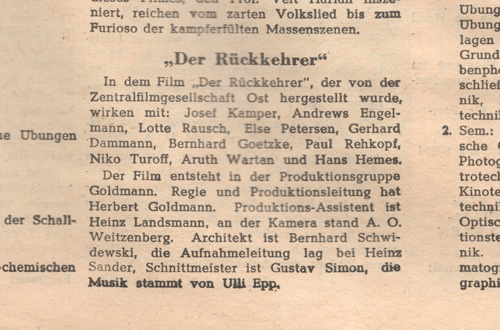
Note the actor Andrews Engelmann – he was born in Saint Petersburg in 1901, fled the Russian Revolution, and worked on films in England in the 1920s and then in Germany. He was a favourite of Director Karl Ritter, appearing as a menacing Russian Cossack in Kadetten, a murderous Bolshevik Baltic States Commissar in GPU (shown below) and as an enemy agent in Ritter's Über alles in der Welt. He was also cast as a Soviet Commissar in the unfinished Spanish Civil War film Legion Condor, also by Ritter. His casting in this ZFO feature film would herefore have been very much valued for its authenticity and he being a native Russian speaker.
Other actors in the film included Gerhard Dammann who appeared in propaganda films such as ....reitet für Deutschland, Über alles in der Welt, and In Namen des Volkes; Bernahrd Goetzke, who was in Paracelsus and Ich klage an; Josef Kampfer, who was in DIII88, Himmelhunde and Der 5. Juni; Lotte Rausch who appeared in Frauen für Goldene Hill and Der zerbrochene Krug; Nico Turoff, who had been in GPU, Stukas and Pour le Mérite; Hans Hemes, who was in Verwehnte Spuren; Artur Wartan, who had appeared in Titanic, Münchhausen, and Carl Peters; Paul Rehkopf, who was in Ich klage an, Jakko and Ohm Krüger. The Cameraman for Der Rückkehrer was Adolf Otto Weizenberg, who also filmed Der ewiger Wald.
The plot of Der Rückkehrer revolved around the return of a Russian farmer from Soviet imprisonment, and the cooperation of the local population with the German occupation authorities in rebuilding. There is no film script extant which can shed more light on the film.
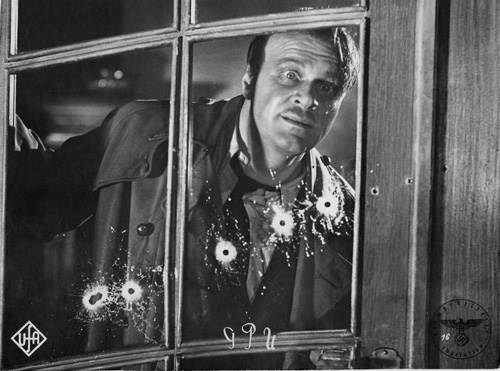
Although we do not have any lengthy correspondence on this film, we do have nine memorandum issued by ZFO and addressed to Jacobi, and one to his wife in his absence. They date from 25 August 1943 to 21 February 1944. They help fill in some details about the work he undertook for this film.
ABOVE: Jacobi's contract with ZFO to work on Der Rückkehrer.
ZFO memos to Jacobi on the film:
25 August 1943 - the first memo below, a certificate or employer attestation, outlines his need for film supplies in working on the kriegswichtig ("important to the war effort") anti–Soviet propaganda feature film as Film Stills Photographer. The film is being commissioned by the Ministry for the Occupied Eastern Territories.
The memo below dated 30 August 1943 states that Jacobi will be traveling to Frankfurt/Oder for work on a film project for about two months' duration. Note the ZFO rubber-stamp.
On 1 September 1943 he received a handwritten note from Detlef Behrens at ZFO asking him to go to the Berlin am Zoo train station and take the train to Frankfurt/Oder and report to a hotel where other team members would be assembling and to await further instructions.
Two days later, another ZFO certificate from its Goldmann Production Group stated that Jacobi would need to travel frequently back and forth between Berlin and Frankfurt/Oder working on Der Rückkehrer. This would have given him travel rights on the road or on the Reichsbahn trains.
On 9 September 1943 another certificate stating that Jacobi's film work would commence on 1 September and run until the end of October.
On 26 October 1943 a ZFO requisition for him to purchase 2 film development cans and a lamp.
On 4 December 1943, a ZFO letterhead Marschbefehl (travel orders) was issued stating that a Horch passenger car, licence number IA220738 would be traveling between Frankfurt/Oder and Berlin with important negative film material for the 'important to the war' anti–Soviet film Der Rückkehrer and that the person responsible for this transport was Herbert Jacobi, on the ZFO staff.
Obviously, as ZFO had previously indicated that the work would finish 'by the end of October,' the work on the film had been seriously delayed. [In fact, the film was never finished and only exists as silent footage in the German Federal Film Archive.]
A ZFO memo dated 8 December 1943 to Jacobi reminds him that any staff in the production company who fell ill must produce within three days a signed doctor's certificate noting the nature of the illness and a prognosis as to when they are expected to be able to return to work. He is requested to produce this certificate by the next day.
On 12 December 1943 a ZFO memo requests him to attend the screening that evening at the Berlin Scala Cinema of "all of the film rushes" on Der Rückkehrer.
The memo is issued by Goldmann Production/ZFO and signed by Goldmann.
The final ZFO correspondence we have is dated 21 February 1944. It is addressed to his wife from ZFO staffer Detlef Behrens. It states that Behrens is relieved to know that the film negatives are in safe hands, and he wishes that her dear husband, lying in hospital, a speedy recovery.
Although Jacobi's contract work for both film production groups was now finished, we have a letter from Jacobi to Rex–Film dated 3 April 1944. In it, he states that he had sent to them 40 high gloss enlargements in response to their letter of 2 September 1943, in four separate packages, but that only two of them safely arrived in Berlin. The missing exposures were those of scenes about pest control, soil culture, fishing in Winniza, and beekeeping. He enclosed an invoice for their replacement cost.
A letter from Rex–Film dated 15 April 1944, states that as he was an employee of Rex–Film when the photographs were taken as part of his employment, all rights to the images automatically are held by Rex–Film, and not by him. But they are willing to offer him an honorarium of RM 70, - for them and they sweeten the offer by indicating that if the photos are published, he will be credited on them as the photographer.
A later letter to Rex–Film from Jacobi dated 8 July 1944, also relates to this dispute. He says that Munck had verbally told him to bring his own (Leica) camera to the Ukraine, and that he had done so and that "my camera was uninsured, and I took it at my own risk into this Partisan area. I used my own film and carried out the film development and enlargements after the end date of my contract." He said that he had sent them 40 enlargements on 2 September 1943 and a further 43 enlargements on 18 June 1944, and that he believed that he should receive RM 4,50- per photo for them, and that on receipt of their agreement he will forward an invoice.
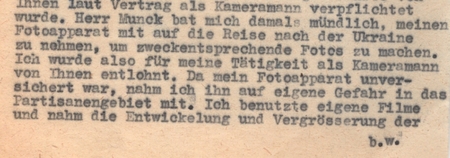
Part of Jacobi's letter complaining about working in Partisan areas with his own camera.
Rex–Film replied on 20 July stating that they were not in agreement and they ask him to telephone. There must have been a further correspondence from Rex–Film (not in our possession) because Jacobi writes to Munck personally a month later, on 20 August 1944. In that letter he mentions having received a threatening letter from Rex–Film, and he had taken up the matter with the Fachschaft (meaning the Reichsfilmkammer) and held numerous meetings there on the subject. He says that RM 373, 50- for all 83 enlargements must be paid. He appeals to Munck to accept this way to conclude the long-standing dispute, or Jacobi will be forced to turn to the Fachschaft again. He reminds Munck that he was engaged only as a photographer, and that there were no special arrangements regarding prints.
In the final letter that we have, dated 31 August 1944, Jacobi reiterates to Munck the facts of the dispute and his demand for compensation, to bring the year–long dispute to an end. Otherwise, he would seek counsel from the Reichsfilmkammer.
He mentions in this letter an interesting fact that he shot in total some 36 rolls of film in the Ukraine of which the majority was lost in the post between Dnepropetrovsk and Berlin. Only 15 rolls were delivered to Rex–Film. He had bought all the film stock himself and was out-of-pocket.
After the ZFO and Rex–Film work was finished, Jacobi then at age 29, took on new training to be a press photographer in Berlin in mid– 1944; but was advised on 7 December that "You have been put on hold for half a year from training as a photo reporter because you did not meet the requirements that must be placed on a future editor and photo reporter." He was asked to let the German Press Association know whether he wished to take the examination again at the beginning of March 1945, from which, if successful, he would finish the course on 1 April 1945.
His fate thereafter is unknown. Perhaps he was obliged to join the Volksturm or died at the end of the war in Berlin. Perhaps he survived.
©2020 by German Films Dot Net. All Rights Reserved.
